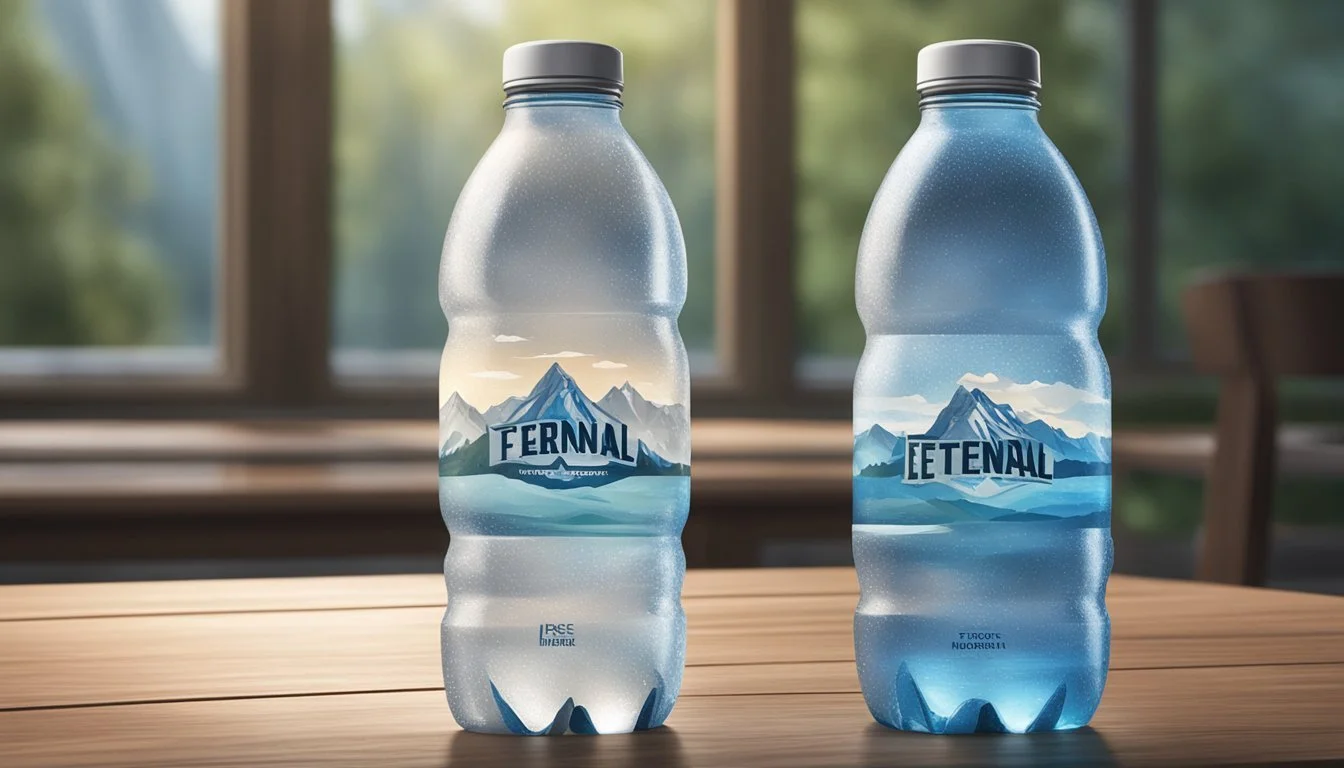Eternal vs. Ice Mountain
Comparing Quality and Taste in Bottled Water Brands
In the landscape of bottled water, consumers are presented with an array of choices, each with its own branding and source story. Two brands that often find themselves in the shopping carts of discerning customers are Eternal and Ice Mountain. Eternal offers naturally alkaline spring water that boasts a high pH level and electrolytes, targeting health-conscious individuals who prefer their water to come with additional benefits. Ice Mountain, on the other hand, sources its water from springs in the heart of America's Midwest, providing a refreshing taste that's rooted in its regional origins.
The comparison between Eternal and Ice Mountain goes beyond taste; it delves into the nuances of water sourcing, processing, and even packaging. As consumers increasingly prioritize sustainability and purity, the aspects that differentiate bottled water brands grow in importance. Eternal claims a commitment to environmental stewardship, employing eco-friendly packaging, while Ice Mountain focuses on delivering a consistently clean and natural product. Both brands have cultivated their own following, and choosing between them can depend on factors ranging from personal taste preferences to environmental considerations.
Understanding which bottled water is "better" can be subjective and often hinges on one’s values and the intended use of the water. Whether one is looking for hydration with a higher pH balance or a taste of the Midwest's natural springs, both Eternal and Ice Mountain serve specific niches in the market. This article aims to dissect these brands in terms of source quality, taste, and the overall drinking experience to help consumers make an informed choice.
Understanding Bottled Water
When choosing bottled water, consumers are often faced with an array of options each boasting unique benefits. Comprehension of water types and regulatory measures ensures an informed selection.
Types of Bottled Water
Bottled water primarily falls into two categories: spring water and purified water.
Spring Water: This type is sourced from natural springs and must be collected at the spring or through a borehole tapping the underground formation feeding the spring. Spring water carries a range of naturally occurring minerals and is often minimally treated, retaining its natural composition.
Purified Water: Obtained from municipal, well, or spring sources, this water undergoes rigorous purification processes. Techniques like reverse osmosis, distillation, or deionization ensure the removal of dissolved solids. Purified water often has a neutral taste, with some brands adding electrolytes for improved hydration and taste.
Bottled Water Regulation
The bottled water industry is subject to stringent oversight to ensure safety and quality.
U.S. Regulations: In the United States, the Food and Drug Administration (FDA) regulates bottled water as a packaged food product with standards for safety, quality, production, and labeling. Bottled water must comply with the National Primary Drinking Water Regulations and is tested for microbial and chemical contaminants.
International Standards: The International Bottled Water Association (IBWA) provides additional guidance and industry standards, often exceeding government regulations. The IBWA also promotes best practices within the bottled water industry, including environmental stewardship and resource management.
By understanding these key aspects, consumers can make choices that align with their preferences and values regarding taste, quality, and source.
Health and Hydration
Choosing between Eternal and Ice Mountain bottled waters involves understanding their impact on hydration and health. Consumers should consider the quality of the water, including the presence of contaminants, and its ability to effectively hydrate.
Importance of Hydration
Hydration is essential for maintaining body functions. It supports the circulatory system, aids in digestion, and helps regulate body temperature. Effective hydration comes from drinking fluids that are free from harmful substances. Eternal Water boasts naturally occurring electrolytes and a high pH level, which may enhance hydration. In contrast, Ice Mountain Water, with its slightly alkaline pH of about 7.8-8.2, suggests it can also aid in keeping individuals properly hydrated.
Health Risks of Bottled Water
Bottled water can carry health risks if it contains contaminants:
Lead: Exposure to lead through contaminated water can lead to serious health issues, including neurological damage.
Heavy Metals: Some bottled waters have been found to contain heavy metals, which can be detrimental to health with long-term exposure.
PFAS Chemicals: These are synthetic chemicals found in some water supplies that can have adverse effects on health.
Other Contaminants: Bottled water, depending on its source and processing, may contain varying levels of contaminants.
Eternal Water's source is protected and is reported to have natural filtration, reducing the risk of contaminants like lead and heavy metals. Ice Mountain, while not associated with harmful levels of fluoride as indicated in the search results, should still be scrutinized for potential contaminants such as PFAS chemicals. Consumers must refer to water quality reports to ensure safety.
Eternal and Ice Mountain Overview
In this section, readers will gain insight into the unique properties of Eternal Water and Ice Mountain Natural Spring Water, two prominent brands in the bottled water market.
Eternal Water
Eternal Water is sourced from naturally alkaline springs. These springs are typically found in remote locations, and the water from these sources is known to have a higher pH level due to the presence of minerals like calcium, potassium, and magnesium. The company emphasizes that their water is bottled at the source and it retains its natural minerals and electrolytes without the need for any artificial enhancements.
Ice Mountain Natural Spring Water
Ice Mountain Natural Spring Water is sourced from carefully selected springs located across the Midwest. It is advertised as 100% natural spring water, which is filtered naturally through layers of rock and sand before being collected, preserving the water's natural composition and quality. The company takes pride in sustainable sourcing and its commitment to protecting the environment where its springs are located.
Taste Profile and Water Sources
When discussing bottled water brands such as Eternal and Ice Mountain, it's crucial to examine both the taste profile and the origins of the water. These two aspects offer insight into the overall quality and consumer experience associated with each brand.
Factors Affecting Water Taste
Taste is subjective, but it's affected by quantifiable factors such as mineral content and pH level. Eternal Water is naturally alkaline, with a pH that typically ranges above 7.0, and is derived from protected underground springs. The water also contains minerals like calcium and magnesium, which can enhance taste, sourced from the remote Shasta-Trinity Alps in California. These elements result in a smooth and refreshing taste with balanced mineral notes.
In contrast, Ice Mountain is known for its source in the Midwest, chiefly the Smoky Mountains. The water drawn from these regions is distributed across different varieties, including spring water, which can introduce a variety of tastes depending on the specific source and filtration processes involved.
Source Transparency
Consumers are increasingly interested in the origin of their bottled water. A commitment to source transparency is a strong indicator of a brand's dedication to quality and consumer trust.
Eternal Water prides itself on offering natural water that's never artificially altered; their labeling shares details about the water's journey from the Shasta-Trinity Alps to bottle. This open disclosure supports the brand's image of providing a pure and untouched product.
Ice Mountain, meanwhile, provides clear labeling that allows consumers to trace the water back to its source in the Smoky Mountains and other locations. Their commitment to transparency is reinforced by offering access to water quality reports, ensuring that customers are informed about the water they are drinking.
Environmental Impact and Packaging
When comparing Eternal and Ice Mountain bottled water, it's essential to consider the environmental consequences of their packaging options and the steps they take toward sustainability.
Plastic Pollution and Alternatives
Plastic waste is a significant environmental issue associated with bottled water. Ice Mountain water comes in plastic bottles, which may contribute to pollution unless properly recycled. BPA (Bisphenol A), a chemical used in manufacturing certain plastics, is a concern for many consumers; however, many bottled waters, including Ice Mountain, are now offered in BPA-free bottles, minimizing associated health risks.
Alternatives to traditional plastic include glass bottles and boxed water. Glass is widely recyclable and can offer a higher level of sustainability due to its non-toxic and inert nature. Boxed water, using cartons made from paper, a renewable resource, presents a more eco-friendly option, as it generates less plastic waste and is often easier to recycle.
Sustainability Initiatives
Sustainability initiatives are critical for bottled water brands to help mitigate their environmental impacts. Ice Mountain states its commitment to sustainability by improving the recyclability of its packaging and reducing its carbon footprint. On the other hand, Eternal Water touts its use of naturally protected sources and sustainable packaging practices, yet the specifics are crucial to understand the true impact.
Both brands face the challenge of reducing the environmental impact of their products, from responsible sourcing to packaging disposal. Consumers increasingly favor companies that proactively address their carbon footprint, use sustainable materials, and implement programs to offset the environmental costs of production and distribution.
Comparative Analysis
When considering bottled water options, consumers often weigh factors like quality, cost, and personal taste preferences. This analysis directly compares Eternal and Ice Mountain across key aspects to determine their standing in the market.
Quality and Purity
Eternal Water boasts natural alkalinity and mineral content, claiming their water originates from protected underground springs. The brand emphasizes the lack of artificial enhancements and the presence of naturally occurring electrolytes. Ice Mountain, on the other hand, sources its water from midwestern springs and is known for undergoing thorough filtration and quality assurance processes. Both brands are compliant with the FDA's quality standards, but Eternal tends to highlight its natural source and mineral benefits.
Price Point and Availability
In terms of pricing, Ice Mountain is generally seen as more budget-friendly and is widely available across various retail outlets, making it a convenient option for consumers. Eternal Water is often priced higher, reflecting its positioning as a premium product. It may not be as readily available as Ice Mountain but can be found in select stores and online platforms.
Eternal Water: Premium pricing, selective availability.
Ice Mountain: Economical, widely available.
Consumer Preferences
Consumer preference can vary based on individual taste and perceived benefits. Some consumers prefer the taste and potential health benefits attributed to the naturally alkaline water offered by Eternal. Others opt for the cost-effectiveness and accessibility of Ice Mountain, which has a long-standing presence and trust in the bottled water market. Consumer reports and reviews often point to these factors when ranking bottled water brands from worst to best.
Eternal Water: Favoured for natural alkalinity.
Ice Mountain: Chosen for affordability and trust.
Final Thoughts
When deciding between Eternal and Ice Mountain, the consumer's preference for taste, quality, and brand ethics plays a crucial role. In this final section, we’ll present key considerations for the reader to make an informed decision and offer insights into the bottled water industry.
Making an Informed Choice
Consumers should weigh the following factors:
Taste: Eternal has a unique mineral profile that some may prefer over Ice Mountain, which is often described as having a classic, clean taste.
Source: The source of the water, natural springs versus artesian wells, may influence one's choice based on perceived purity and mineral content.
Sustainability: One should consider the environmental impact of the brand's bottling and distribution processes.
A table for quick comparison:
Aspect Eternal Ice Mountain Taste Mineral-rich Clean, Fresh Source Natural Springs Artesian Wells Sustainability Check Company Policy Check Company Policy
Industry Insights
The bottled water industry is highly competitive, with companies vying for consumer trust:
Brand Reputation: Some of the best water brands have established reputations based on consistent quality and ethical business practices. Consumers typically favor brands that transparently disclose sourcing and filtration methods.
Consumer Trends: Current trends indicate a growing demand for not only high-quality water but also environmentally friendly packaging and practices.
In summary, for customers aligning with industry trends and seeking quality, both Eternal and Ice Mountain could satisfy different preferences. It's the consumer's values and taste that will determine their bottom line choice.




